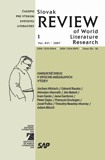Benajmin a neeurópskosť?
Benjamin and the Non-European?
Author(s): Adam BžochSubject(s): Cultural Essay, Political Essay, Societal Essay
Published by: SAV - Slovenská akadémia vied - Ústav svetovej literatúry
Keywords: Benjamin; European; cultural memory; theory of culture
Summary/Abstract: Was W. Benjamin an intellectual connected exclusively with European, or Jewish traditions of thought, or was he also a pioneer of cultural difference, gaining relevance, above all, today, in the epoch of globalization of culture? From the amount of Benjamin’s examples of non-European art (however, particularly Arabic or Far Eastern art), possibly marginal remarks spread throughout his theoretical and critical work since 1920s till his death, we can show that the construction of his extensive and ambivalent theory of culture (including the notions incorporated in the essay The Work of Art in the Age of its Technical Reproduction), was permanently determined by his subliminal interest in geographically distant civilizations. Benjamin considered them an important means of critical self-experience, and questioning of Eurocentrism. The author shows that Benjamin’s way of thinking corresponds to the post-colonial discourse not only in the meta-theoretical way, but particularly by means of understanding of the concreteness of non-European cultures, but, at the same time, he exalts the fact that the approximation of the non-European in Benjamin deals both with “material semi-exoticism”, and his notion of individual and collective cultural memory.
Journal: Slovak Review of World Literature Research
- Issue Year: 2007
- Issue No: 01
- Page Range: 80-86
- Page Count: 7
- Language: Slovak

